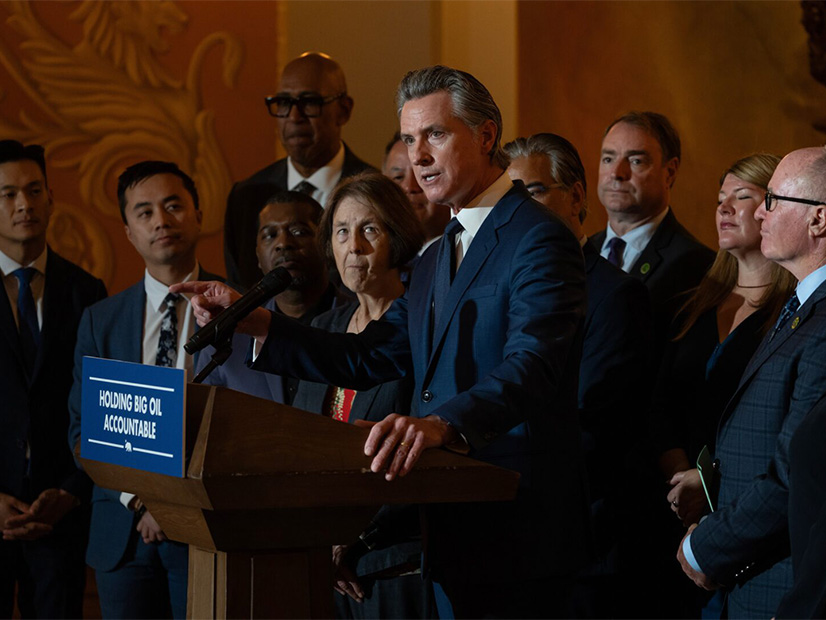
California Gov. Gavin Newsom is convening a special session of the state legislature to take steps “to safeguard California values” — including the fight against climate change — ahead of President-elect Donald Trump’s second term.
In a proclamation issued Nov. 7, Newsom (D) said he wants lawmakers to consider additional funding for the state Department of Justice and other agencies so they can quickly challenge actions taken by the Trump administration. The special session will begin Dec. 2.
“The consequences of his presidency for California may be significant and immediate,” Newsom said in the proclamation.
Those consequences include potential actions such as dismantling clean vehicle policies “that are critical to combating climate change,” the proclamation states.
Another concern is that Trump will block federal disaster response funding to California as political retribution. During his campaign, the former president threatened to withhold wildfire aid to the state if Newsom didn’t back his policies.
Newsom also wants to fend off potential Trump administration attacks on reproductive freedoms and immigrant families in California.
Past Experience
During Trump’s first term as president, California filed more than 120 lawsuits challenging actions taken by his administration. Newsom said he’s been working with the attorney general’s office for over a year to prepare for the possibility of a second Trump term.
The additional funding Newsom seeks would help ensure the state can file litigation immediately and seek injunctive relief against federal actions.
“We’re working closely with the governor and the legislature to shore up our defenses and ensure we have the resources we need to take on each fight as it comes,” California Attorney General Rob Bonta (D) said in a statement.
The fight against climate change has strong support in the state. Voters on Nov. 5 passed Proposition 4, a $10 billion climate bond measure to fund wildfire programs, clean energy and other projects. (See Calif. Lawmakers Send $10B Climate Bond Measure to Nov. Ballot.)
“This result demonstrates voters want California to be at the forefront of climate action because our health, lives and livelihoods are at risk,” Katelyn Roedner Sutter, the Environmental Defense Fund’s California state director, said in a Nov. 6 statement.
Waiver Battle
California’s zero-emission vehicle regulations are a key concern for the state under the new Trump administration. In 2022, the state adopted rules banning the sale of new gas-powered cars in 2035; the sale of new diesel trucks will be prohibited starting in 2036.
California may set its own zero-emission vehicle and tailpipe emission standards instead of implementing federal standards under a provision of the federal Clean Air Act. The state must submit its emission rules to EPA and receive an EPA “waiver of federal preemption” before a rule may be enforced.
Other states have an option to adopt California emission regulations rather than follow federal standards.
California’s right to set its own standards was revoked in 2019 during Trump’s first term, and then reinstated in 2022 under the Biden administration. The reinstatement was challenged by Ohio and 16 other states along with oil and gas interests. A federal appeals court rejected the challenge in April 2024.
In 2020, while California’s emissions waiver was suspended, six automakers entered into voluntary agreements with the California Air Resources Board (CARB) to reduce greenhouse gas emissions of their vehicles each year through 2026 and speed the transition to zero-emission vehicles.
Stellantis entered into a similar agreement with CARB in March 2024.
CARB also made a deal with truck manufacturers in July 2023 called the Clean Truck Partnership. In exchange for CARB giving manufacturers more flexibility to comply with its regulations, the truck makers pledged to meet California’s vehicle standards, including a requirement to produce and sell only ZEVs starting with model year 2036.
The manufacturers agreed to stick with their commitment even if the regulations face legal challenges and regardless of CARB’s overall authority to implement those regulations. (See CARB, Manufacturers Partner to Support Clean Truck Rules.)
Airline Partnership
California continues its trend of voluntary agreements with industry. On Oct. 30, CARB announced an agreement with Airlines for America, which represents almost a dozen major airlines, regarding increasing the availability of sustainable aviation fuel.
CARB and Airlines for America will work to ensure that at least 200 million gallons of cost-competitive, sustainable aviation fuel is available to airlines in the state by 2035.
The amount would meet about 40% of intrastate travel demand and is a more-than-10-fold increase from current levels, CARB said.



